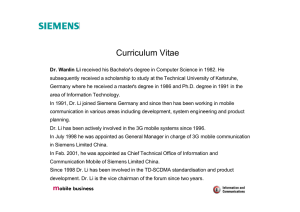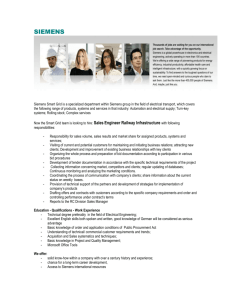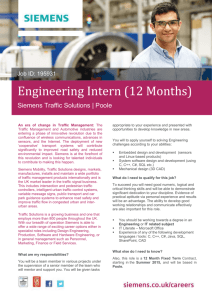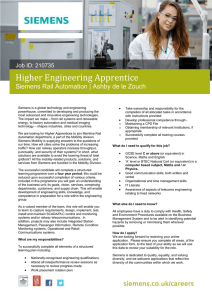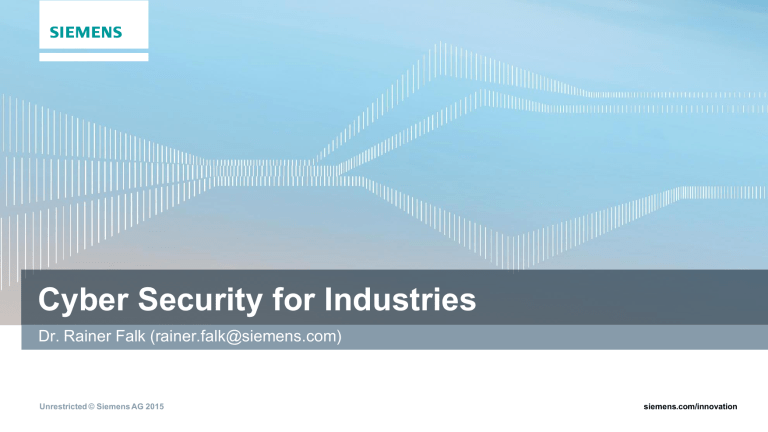
Cyber Security for Industries
Dr. Rainer Falk (rainer.falk@siemens.com)
Unrestricted © Siemens AG 2015
siemens.com/innovation
Siemens – Vision 2020
The partner of choice for
§ Electrification
§ Automation
§ Digitalization
Siemens stands for the
electrification of the world
Downtown Singapore
Unrestricted © Siemens AG 2015
Page 2
July 2015
Corporate Technology
Our innovative power in figures
Siemens as a whole and Corporate Technology
Expenditures for research and development – our greatest strength
€
€
€4.4 billion
28,800
Expenditures for R&D –
€400 million more than in fiscal 2014
R&D employees1
Inventions and patents –
securing our future
8,600
4,300
inventions1
patent applications
1 In fiscal 2014
Page 3
University cooperations –
our knowledge edge
7
CKI
universities
17
principal partner
universities
Corporate Technology –
our competence center
for innovation and
business excellence2
7,800
5,100
employees
worldwide
software
developers
1,600
400
researchers
patent
experts
2 Employee figures: status May 2015
unrestricted © Siemens AG 2015. All rights reserved
Our global presence
Partner to customers all over the world
St. Petersburg
Moscow
Princeton
Beijing
Berkeley
Shanghai
Moscow
Tokyo
Gurgaon
Pune
Bangalore
Erlangen
Munich
Prague
Nuremberg
Bratislava
Vienna Budapest
Cluj
Brasov
Istanbul
Country with CT facility
Page 4
> 500 employees
100 ‒ 500 employees
Other selected facilities
Status May 2015
unrestricted © Siemens AG 2015. All rights reserved
Our areas of activity: Research cooperations
Overcoming the silo mentality and tapping potential
DTU Copenhagen FAU Erlangen-Nuremberg
RWTH Aachen TU Munich
TU Berlin
7
CKI
universities
UC Berkeley
Tsinghua University
17
principal partner
universities
§ We network with leading universities and non-university research institutes around the world.
§ With Open Innovation, we strengthen Siemens’ innovative power and tap the potential of a networked, open company.
§ We link the industrial and academic worlds and thus promote intensive research and recruiting activities.
§ Our cooperation with seven top universities and the “Centers of Knowledge Interchange” (CKIs) that we set up there are
an excellent example of this.
Page 5
unrestricted © Siemens AG 2015. All rights reserved
Our organization
Corporate Technology at a glance
Corporate Technology (CT)
CTO – Prof. Dr. Siegfried Russwurm
Business Excellence,
Quality Management, top+
Corporate Development Center
evosoft
§ Business excellence
§ Quality management
§ Internal process and production consulting
§ Development partner in the areas of software,
firmware and hardware as well as
engineering
§ Competence center for horizontal and vertical
product and system integration
Corporate Intellectual Property
Innovative Ventures
New Technology Fields
§ Protection, use and defense of intellectual
property
§ Patent and brand protection law
§ Access to external innovations
§ Start-up foundation
§ Commercialization of innovations
§ Research into potentially disruptive innovations
with high market potential
Research and Technology Center
Technology and
Innovation Management
§ Development of technologies
with a broad impact
§ Incubator for innovations of our portfolio
Page 6
§ Siemens’ technology and innovation agenda
§ Standardization, positioning regarding
research policy
§ Provision of publications relating to R&D
University Relations
§ Global access to the academic world
§ Top positioning in terms of university
cooperations
Status May 2015
unrestricted © Siemens AG 2015. All rights reserved
Increasing intelligence and open communication
drive security requirements in various industrial environments
Process Automation
Factory Automation
Building Automation
Energy Automation
Page 7
Urban Infrastructures
Mobility Systems
unrestricted © Siemens AG 2015. All rights reserved
Cyber security needs a holistic approach
People
Technology
Process
Communication
Page 8
unrestricted © Siemens AG 2015. All rights reserved
Our industrial society confesses a growing demand for IT-Security
IT Security trends are determined by drivers such as:
• Industry infrastructures changes (Digitalization)
• More networked embedded systems
• Increasing device-to-device communication
• Need to manage intellectual property
And
• Increasing international organized crime
• Privacy
• Compliance enforcement
• Cyber war fare
• Cloud/Virtualization
• PDAs, Smart Mobiles
• Social Networks / data mining concepts
Page 9
unrestricted © Siemens AG 2015. All rights reserved
The threat level is rising –
attackers are targeting critical infrastructures
Evolution of attacker motives, vulnerabilities and exploits
The Age of Computerworms
Code Red
Slammer
Cybercrime and Financial
Interests
Blaster
Zeus
SpyEye
Politics and Critical
Infrastructure
Rustock
Aurora
Nitro
Hacking against physical assets
Stuxnet
"Hacking for fun"
"Hacking for money"
"Hacking for political and
economic gains"
States
Criminals
Hobbyists
Organized Criminals
Hacktivists
State sponsored Actors
Terrorists
Activists
Anonymous
Credit Card Fraud
Worms
Backdoors
Botnets
Anti-Virus
Phishing
Adware
Hackers
BlackHat
RSA Breach
Banker Trojans
Hacking against critical
infrastructure
DigiNotar
APT
Targeted Attacks
SPAM
WebSite Hacking
Viruses
Cyberwar
SCADA
Identity theft
Sony Hack
# of new
malware
samples
Responsible Disclosure
Major loss of privacy
"Gläserner Bürger im Netz"
# of published exploits
# of published vulnerabilities
2002
Page 10
2003
Data sources:
IBM X-Force Trend and
Risk Report
HP Cyber Risk Report
Symantec Intelligence Report
2004
2005
2006
2007
2008
2009
2010
2011
2012
2013
2014
2015
unrestricted © Siemens AG 2015. All rights reserved
Different factors are driving the research demand for IT Security
New Functionality and Architectures
Security Use Case
Quality of Security
Examples
Examples
Examples
• Connectivity of devices and
systems to public networks
• Know-how protection
• Robust
• Licensing
• Easy to use
• IP to the field
• Long term security
• Use of mobile devices
Page 11
unrestricted © Siemens AG 2015. All rights reserved
The CIA pyramid is turned upside down in
industrial automation and control systems
Industrial Automation and Control
Systems
Office IT Systems
Confidentiality
Integrity
Integrity
Priority
Availability
Confidentiality
Page 12
Availability
unrestricted © Siemens AG 2015. All rights reserved
ISO/IEC 62443 Covers Security Management, System and
Component Level for Industrial Automation Control Systems (IACS)
IEC 62443 / ISA-99
General
Policies and procedures
System
Component
1-1 Terminology, concepts and
models
2-1 Establishing an IACS security
program
3-1 Security technologies for IACS
4-1 Product development
requirements
1-2 Master glossary of terms and
abbreviations
2-2 Operating an IACS security
program
3-2 Security assurance levels for
zones and conduits
4-2 Technical security requirements
for IACS products
1-3 System security compliance
metrics
2-3 Patch management in the IACS
environment
3-3 System security requirements
and security assurance levels
2-4 Certification of IACS supplier
security policies
Definitions
Metrics
Page 13
Requirements to the security
organization and processes of the
plant owner and suppliers
Requirements to a secure system
Requirements to secure system
components
unrestricted © Siemens AG 2015. All rights reserved
Security levels provide for protection against different attack levels
Zones and Conduits
Zone Plant
Conduit
Zone
Diagnosis
Zone Control
Zone Enterprise
Network
The targeted security level is determined by a threat and risk analysis
SL1
Protection against casual or coincidental violation
SL2
Protection against intentional violation using simple means,
low resources, generic skills, low motivation
SL3
Protection against intentional violation using sophisticated means,
moderate resources, IACS specific skills, moderate motivation
SL4
Protection against intentional violation using sophisticated means,
extended resources, IACS specific skills, high motivation
Page 14
unrestricted © Siemens AG 2015. All rights reserved
Security Standard ISO/IEC 62443-3.3 defines security requirements for
industrial control systems
7 Foundational Requirements
FR 1 – Identification and authentication control
FR 2 – Use control
FR 3 – System integrity
FR 4 – Data confidentiality
FR 5 – Restricted data flow
FR 6 – Timely response to events
FR 7 – Resource availability
Page 15
unrestricted © Siemens AG 2015. All rights reserved
Example: System requirements (SR) and requirement extensions (RE) for
foundational requirement FR1 “Identification and authentication control”
Page 16
unrestricted © Siemens AG 2015. All rights reserved
Example: Wireless sensor network
Purpose: Obtain accurate sensing information (not data
communication)
•
nodes often battery powered or energy harvesting
•
wireless communication (low bandwidth)
•
nodes may be static or mobile
•
small to large number of nodes
•
often severely limited resources: processing, memory,
bandwidth
Page 17
unrestricted © Siemens AG 2015. All rights reserved
Security threats for wireless sensor networks
Attacks against wireless communication:
• manipulation, interception, replay, user privacy,
repudiation
• DoS, sleep deprivation, routing security
• traffic flow analysis
Attacks against sensor node
• tampering (physical attacks)
• Reverse engineering
• node capture, node theft, node relocation
Page 18
unrestricted © Siemens AG 2015. All rights reserved
Several session keys are established by the security manager
based on a single join key
• hop-to-hop key (network key)
• end-to-end key with gateway(s)
• end-to-end key with security manager
• end-to-end keys with other nodes
Page 19
unrestricted © Siemens AG 2015. All rights reserved
Overview security-related signaling
Page 20
unrestricted © Siemens AG 2015. All rights reserved
Example: Smart Grid
Secure Communication supports reliable operation
Power Quality Monitoring and Eventing (Transmission/Distribution, Substation)
Communication Standards used: IEC 61850 (GOOSE)
Security uses group- based security integrated in GOOSE (IEC 62351-6)
Generation
Transmission
Substation Automation (Telecontrol and Monitoring)
Inter Control Center Communication
Communication Standards used:
IEC 60870-5-104, IEC 61850
Remote Service
Transport level security through TLS
(IEC 62351-3/4/5)
Application level security through X.509 based authentication +
integrity. (IEC 62351-4)
Page 21
Distribution
Consumer / Prosumer
Microgrids
Connecting electric vehicles to the
charging infrastructure
Communication Standards used:
ISO/IEC 15118, IEC 61850
Transport level security: TLS
Application level security: XML Dig.Sig.
DER Integration (Metering & Control)
Communication Standards used: IEC 61850, XMPP (future use)
Transport level security through TLS (IEC 62351-3/4/5)
unrestricted © Siemens AG 2015. All rights reserved
Example IEC 15118: eCar charging security
Securely connecting the vehicle to the smart grid
Standard for the interface between vehicle and charging station supporting
§
§
§
§
Connection of vehicles to the power grid
Billing of consumed energy (charging)
Roaming of electric vehicles between different charging spot
Value added services (e.g., software updates)
Trust Relations from the electric vehicle
§ Towards backend (energy provider) for signed meter readings and encrypted information (e.g., tariff)
§ Towards charging spot as terminating transport peer
Trap
o
Applica
tion
Electric Vehicle
Page 22
Charging
Spot
Energy Provider with Control
and Billing Functionality,
Clearinghouse, Charge Spot
Provider
e.g., contract related data, meter reading, tariffs, etc.
contract authentication
authentication, transport
protection
XML Security
TLS Security
unrestricted © Siemens AG 2015. All rights reserved
IEC 15118 – Approach based on certificates and
corresponding private keys (PKI)
Electric
Vehicle
• Transport Layer Security to protect exchange
between vehicle and EVSE
Initialization
TLS Session establishment
• Application layer security using XML security for
data exchange with the backend
• Online and Semi-online to the backend
• Persistent connection between vehicle and EVSE
during charging to exchange charging process
relevant information, especially a cyclic exchange
of metering data for provided energy
Page 23
TLS Session establishment
Otional: Request Tariff for Contract ID
Signed Contract Authentication
Meter Status
Signed Meter Receipt
Charging Cycle
Connectivity
Exchange of security relevant
information (Certificate Updates, etc.)
Service Discovery
Note also that the signed meter reading
contains the meter reading itself, but also
session related information like the session ID
as well as the communication partner IDs.
This is explained in the document.
Meter Status
Signed Meter Receipt
Charging Finished
Tear Down
• Public/private key pair incl. certificate
Connection establishment
Payment Details (optional with
encrypted Tariff Information)
TLSprotected Communication
Credentials
Charging Spot
TLS Session Termination
Connection termination
Signed meter readings for billing
TLSprotected communication (may be a temporary or a permanent connection to exchange Information.
In special use cases the TLS connection to the backend may not be available during the charging period.
Approach
Energy Provider with Control and Billing
Functionality, Clearinghouse, Charge
Spot Provider
unrestricted © Siemens AG 2015. All rights reserved
Security has to be suitable for the addressed environment
Awareness and Acceptance
Since security is not just a technical
solution, which can be incorporated
transparently, we need to consider
how humans can get along with this
issue. This needs actions for:
• awareness trainings
• help people to understand security
measures and processes
• provide user friendly interfaces
and processes
Page 24
unrestricted © Siemens AG 2015. All rights reserved
Thank you for your attention!
Page 25
unrestricted © Siemens AG 2015. All rights reserved
Dr.
Rainer Falk
Principal Key Expert
Siemens AG
Corporate Technology
IT Security
CT RTC ITS
Otto-Hahn-Ring 6
D-81200 Munich
Germany
rainer.falk@siemens.com
Unrestricted © Siemens AG 2015
Seite 26

